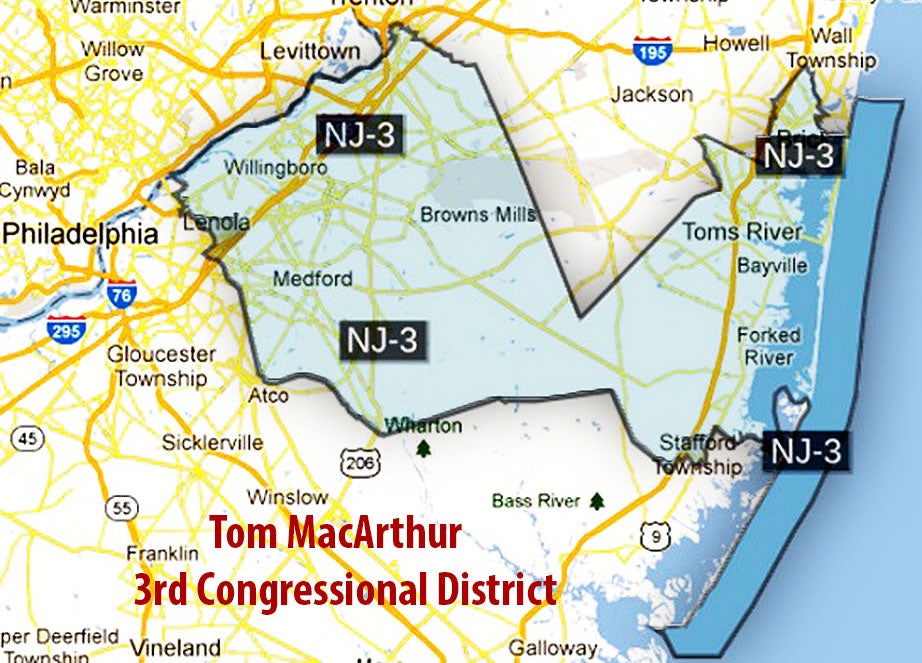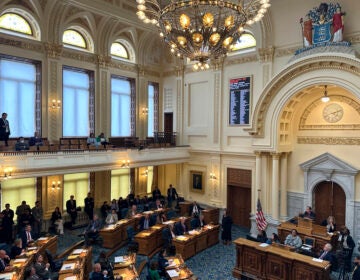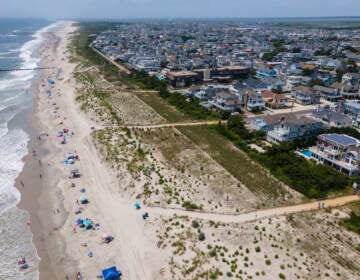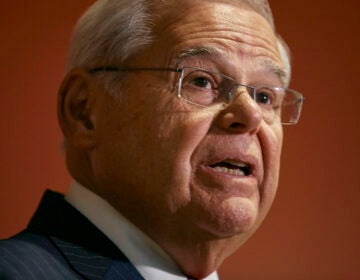Cash-strapped Democrat faces well-funded Republican in N.J.’s 3rd Congressional district

This time two years ago, U.S. Rep. Tom MacArthur was fighting hard for the seat he now holds in New Jersey’s 3rd Congressional District.
The former insurance executive and Randolph mayor had just moved to the area from his home in north Jersey to run for the post, which was being vacated by fellow Republican and former U.S. Rep. Jon Runyan.
It was an open seat race, and the political demographics of the 3rd Congressional District — a broad area of South Jersey that spans the width of the state and consists of majority portions of both Burlington and Ocean counties — made it one of the most competitive congressional contests of an otherwise uncompetitive year. Targeted by national parties on both sides, the race featured the well-moneyed but little-known MacArthur going toe to toe with Democratic opponent Aimee Belgard, a former Burlington County freeholder and homegrown favorite.
MacArthur ultimately won that bout, using his considerable personal finances, campaign chops, and the district’s natural conservative bias. Registered Democrats outnumber Republicans 123,000 to 115,000 in the 3rd District, though its almost 215,000 independents have a long history of leaning Republican; MacArthur won 54 percent to Belgard’s 44 percent of the vote.
Fast-forward to this year and, though the freshman congressman is defending his home turf for the first time in his short political career, the 3rd District race is decidedly less eventful. MacArthur is facing Democrat Frederick John LaVergne, a Delanco resident and former residential mortgage banker who beat out former Asbury Park Councilman Jim Keady (of Gov. Chris Christie “sit down and shut up” fame) for the party’s blessing earlier this summer. But having won the nomination only after a messy county endorsement process, in which Ocean County’s vote went to Keady and Burlington’s to LaVergne, the Democrat does not have the same unified party support that Belgard had in 2014.
At the same time, LaVergne’s campaign has been plagued by financial issues in recent weeks, including a Chapter 13 bankruptcy filing and allegations that he avoided paying rent on one of his campaign office locations.
“Fred LaVergne has been a mess in his own personal life, and I don’t think he has any capacity to really run a campaign and he hasn’t been running one,” MacArthur told NJ Spotlight this week.
MacArthur and LaVergne faced off in 2014 too, when LaVergne ran not as a Democrat but as an independent under the banner of the Democratic-Republican Party. He garnered only 1.7 percent of the vote then, but he said that that bid, as well as a similar one in 2012, enabled him to lay the groundwork for his current campaign. It also allowed him to avoid working with what he called the “specific corrupt aspects of the political machine here in South Jersey,” and said this year’s election is about bringing real leadership to Washington, DC, as opposed to the kind his Republican opponent represents.
“We need someone to go down there and legislate, not just agree to someone else’s legislation,” said LaVergne, referring to MacArthur, who he called a “bobblehead” for special party interests.
A self-labeled “centrist” who is “reviled by the establishment,” LaVergne said some of his major focuses are on improving the district’s economy and infrastructure, which remain battered by the 2008 economic crisis and the effects of Hurricane Sandy in 2012. His campaign has proposed a flood-control system be put in place with the help of the Army Corps of Engineers to help block storm surges at shore inlets, as well as removing the cap on maximum taxable earnings under Social Security, which he said would “instantly makes Social Security permanently solvent.”

The Ocean County portion of the 3rd District was one of the hardest-hit areas of the state during Hurricane Sandy, encompassing over 40,000 of the estimated 72,000 homes damaged or destroyed by the storm. It’s also home to one of the largest senior populations in New Jersey, with over 100,000 retirees.
MacArthur, for his part, also ranked those issues among his top priorities in the district, citing work he’s done on them in Washington since he took office in 2015. Earlier this year, the Republican called for a congressional investigation into the Federal Emergency Management Agency, as well as the resignation of its director, alleging that the agency had shortchanged thousands of victims of Hurricane Sandy by denying or lowballing claims through its flood insurance program. He also helped pass the FEMA Disaster Assistance Reform Act of 2015 last year, sponsoring his own provision in the legislation that prevents FEMA from recouping funds — awarding relief money to victims of natural disasters only to later change its determination — except under certain circumstances.
A ranking member of the Armed Services Committee and two of its subcommittees, the Subcommittee on Tactical Air and Land Forces and Subcommittee on Military Personnel, MacArthur has also been involved in military affairs and foreign policy issues. He’s been a vocal critic of the Obama administration’s nuclear arms deal with Iran, and has sponsored legislation in the House preventing the Department of Defense from retiring the KC-10 refueling tanker planes now stationed at Joint Base MacGuire-Dix-Lakehurst, one of the 3rd District’s main economic engines.
The 3rd District is also home to one of the state’s largest military and veteran populations, with the joint base supporting some 100,000 indirect jobs for the area.
“[Under Obama,] this country has been consistently late to respond to issues in Syria, pulled out too early in Iraq, and created a vacuum in Libya that ISIS has exploited,” MacArthur said. “The long and the short of it is our allies I don’t see us as reliable and our adversaries are taking advantage of us.”
Unlike some House races in the state this year, the 3rd district has been seemingly less affected by the tense presidential race between Hillary Clinton and Donald Trump. That could be because of the low-profile nature of the contest, in which LaVergne’s underwhelming campaign financing has left him little fodder to attack MacArthur on his support for Trump. The Democrat raised just $600 in the first quarter of 2016, according to Federal Election Commission filings, but hasn’t reported anything since. MacArthur, meanwhile had raised almost $1.5 million as of last month, and spent almost as much, leaving him with a cash-on-hand of close to $300,000.
MacArthur’s biggest contributions came from defense companies like Lockheed Martin, leadership PACs like the one run by the Tuesday Group, which was founded by a group of Republican centrists in the House, and York Risk Services Group, where MacArthur formerly served as chairman and chief executive officer.
While he said he strongly denounces the Republican presidential nominee’s recent rhetoric against women — he characterized it as “self centered, demeaning remarks that in my view not only have no place in politics but have no place in civil society” — MacArthur said he still plans on supporting Trump next month. He called Hillary Clinton a “terribly flawed” candidate, but said that given two bad choices, “I would rather support the person that I think we can get the most done with in Congress, and while I don’t always agree with [Trump’s] values, I do agree with many of his concerns.”
“I said long ago that I was not going to answer for everything that Donald Trump says,” MacArthur said. “I think my job is to make sure voters know who I am and what I stand for and what I’m doing, and I trust them to do that. I think voters particularly in this cycle are looking at the top of the ticket as its own campaign, and everything below the very top will be judged on its own terms.”
“Nobody’s going to mistake me for Donald Trump,” he added.
Indeed, despite the backlash against Trump in some areas of the country, MacArthur is likely safe either way, given the 3rd district’s history of leaning Republican. While President Barack Obama won the district twice, voters split their ballots in 2012, reelecting Runyan by a 9-point margin after the former football star bested Democrat Shelly Adler. Adler’s late husband was former U.S. Rep. Jon Adler, who Runyan ousted in a narrower vote two years earlier and who is the only Democrat to have won the seat in over 50 years.
The district’s conservative bent was made worse in 2011, when redistricting added Ocean County’s Brick township and removed Burlington’s Cherry Hill, a Democratic stronghold.
Still, LaVergne said he’s hopeful that a passionate following of voters will help carry him to Washington next month. He offered lukewarm praise for his own party’s nominee but argued that the most important battle is one for Congress, where he said he’ll fight to take a more “fiscally responsible” approach to governing. The Democrat supports student debt reform, including better options for loan refinancing, as well as raising the minimum wage — though he said lawmakers also have to do a job “protecting American currency.”
Asked about recent allegations relating to his financial problems, LaVergne didn’t deny them, but said some had been “manufactured” by his political enemies and that they shouldn’t be a factor in judging his candidacy. He said he’s seen huge support from both Republicans and Democrats, and aims to serve voters from all party backgrounds.
“I have financial issues, a lot of people have financial issues in this district,” LaVergne said. “But you know what, voters aren’t electing my wallet, they’re not electing my wardrobe. They’re electing my heart and my intellect. My problems that I have, if we expose the same thing on everybody else, there’s a lot of folks that people wouldn’t consider. All they can do is throw mud right now.”
Both men said they are proponents of more bipartisanship in a gridlocked Washington. MacArthur has gained some recognition in his first term for taking the Democrats’ elevator to the floor of the House during voting sessions, and LaVergne said he would look to build bridges in Congress should he win the election.
“After 30 years in business, I’ve learned you deal with all kinds of people. You don’t have to agree with them, you don’t have to accept them, but you work with them,” MacArthur said. “And I’ve worked very hard to work across party lines in Washington. And I try to get to know people in the other party, because I think it’s very important for our nation that both parties work together to solve problems. Unfortunately, that doesn’t happen as much as it needs to in DC.”
“There’s a Native American proverb: The eagle can’t fly without both wings,” LaVergne said. “I don’t need the permission of the political bosses, and that’s the thing that scares them the most.”
Also on the ballot is third-party candidate Lawrence Berlinski Jr., of Bayville, who is running under the banner of the Constitution Party.
Follow this link for an interactive overview of District 3.
(Editor’s note: All 12 of New Jersey’s Congressional seats are up for election on November 8. Currently Democrats control six and Republicans control six)
____________________________________________
NJ Spotlight, an independent online news service on issues critical to New Jersey, makes its in-depth reporting available to NewsWorks.
WHYY is your source for fact-based, in-depth journalism and information. As a nonprofit organization, we rely on financial support from readers like you. Please give today.




